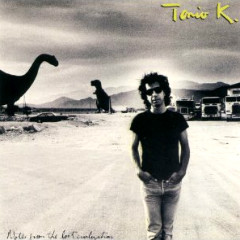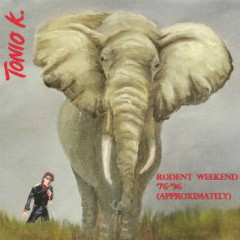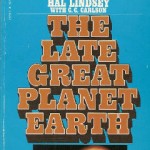
I first ran across Tonio K.’s music when I was sorting through a pile of LPs and CDs at a rummage sale around 1992. There, among all the scratched vinyl and broken jewel cases, I found a disc titled, “Notes from the lost Civilization,” issued by What?/A&M Records in 1989. The album was packed with intelligent political and social commentary (rare for pop music) and even clever satire. Who was this guy? Never heard of him before. And it didn’t seem likely that I’d hear of him again later, either. At the time, I figured he was just of many one-album wonders.
I was wrong.
After a fleeting bit of fame in the late ’70s and early ’80s — during which he received praise from Rolling Stone for two albums that Stereo Review called the greatest recordings ever — Tonio K. slipped off the musical radar screen, popping his head up only here and there and never for very long. He had his core fans, but by and large the mainstream paid about as much attention to him as any other guy you never heard of.
After making the rounds, record label to record label, and becoming the victim of the music industry’s version of corporate downsizing (one of his albums got canned because his previous release didn’t sell enough units), Tonio K. retired almost exclusively to songwriting. Pity. While he was writing music for, and with the likes of, Wynonna Judd, Charlie Sexton, Bonnie Raitt, Al Green, T-Bone Burnett, Aaron Neville, Tanya Tucker, and Vanessa Williams, it was still a shame. Sure, he was finally getting decent pay, but what’s money when you’re one of the most caustic, satirical, wry-witted, scathing social critics and solo artists alive?
That’s of course who Tonio K. really is. One music critic described him as “a one-man, rock-and-roll wrecking crew.” Another, writing for Stereo Review claimed he was “twice as angry as Elvis Costello, and six times as funny.”

And thanks to Mitch Cantor and Gadfly Records, you can now get nearly all of Tonio K.’s music catalogue, including smash hits like “The Night Fast Rodney Went Crazy,” “One Big (Happy) Family,” “Where is That Place?” and the classic, “What Women Want.” Also available are long lost favorites like, “New Dark Ages,” “Mars Needs Women,” and “Everything, Including You, Disgusts Me.” You can even get the epic saga, “The Ballad of the Night the Clocks all Quit (and the Government Failed).”
Christened with the very unlikely handle of Antonio Vladimer Stephen Michael Krikorian, Tonio K. (for short, I imagine) was born in central California in 1950 into the home of two lovely parents who kept him properly incubated until he could be released upon a world of feather-headed disco fiends, introspective, drug-addled hippies, and singer-songwriters amply demonstrating that they could neither sing nor write songs.
As an angry retort to the Love Generation, musically K.’s a cross between Elvis Costello, Bob Dylan and Frank Zappa, and one steady theme runs through every album he’s ever cut: humanity has generally run amok and gone completely bazoo. The song, “Indians and Aliens,” from his just-released “Yugoslavia” album, gives a pretty clear picture of this. The scene is a wedding taking place on a front lawn. From out of the blue a spaceship lands and an alien steps out and says,
There is a rumor circling deep space
About a planet, about a race
Of whackos and losers, weasels and jerks
They say this planet was once called the earth
I think we’ve found it.
You can also hear it in “The Funky Western Civilization,” a cut from the “Life in the Foodchain” album, and which might be the only dance tune ever recorded that bothers to address the general decline of societal values in the Western World:
They put Jesus on a cross
They put a hole in JFK
They put Hitler in the driver’s seat
And looked the other way
Now they’ve got poison in the water
And the whole world in a trance
But just because we’re hypnotized
That don’t mean we can’t dance
We’ve got the funky
The funky Western Civilization
Somewhere in passing I had read that Weird Al Yankovic was a fan of K. I couldn’t figure out why. “Notes” was, overall, a serious album — even the humor was dark, satire noir. The rumor, however, made terrific sense after hearing “Foodchain.” Along with dance songs about societal decline and a ballad about a bad union deal, the second half of the album is a collection of bizarre love songs, including one — “How Come I Can’t See You In My Mirror?” — about a vampire and her ignorant boyfriend.
As the song goes, at some point in their relationship the guy gets a little puzzled about certain habits of his gal — picking her teeth in public, wearing only black and red, staring at his neck — and decides to ask her some questions:
How come I can’t see you in my mirror?
How come you never come around here in the day?
How come you start to hiss when I say my prayers
And you wear those stupid capes
And every time you see a cross you run away?

You never get an answer in the song, but in the context of K.’s general spin on love and relationships, the guy probably gets bit.
Most folks would say after hearing a few of K.’s love ditties that he’s a bit cynical about male/female relationships. Some folks even call him a misogynist. I don’t think so. I think he’s just doing what social critics do — bringing up things that irritate us and make us realize that we’re jerks.
In “Student Interview (With The Third Richest Man In The World),” another track off “Yugoslavia,” the rich man notes that just having a red Ferrari is enough for women to “practically fall into bed.” The sentiment echoes K.’s earlier hit from the late ’80s, “I’m Supposed to Have Sex With You,” in which he satirizes the low rung sex occupies on the relational ladder. A guy dances with a girl at a party, doesn’t even know her, and then says, “I’m supposed to have sex with you.” Forget love, forget relationship, forget marriage. Anyone wonder why men and women are so messed up?
“The hippie ethos of ‘Have sex with everyone you want to; it will be OK as long as you’re not hurting anyone’ is utter jive,” K. told Harvest Rock Syndicate in a 1988 interview.
“I think the ideal of peace and love, without defining terms, was bound to fail.” Why? “Because what peace and love in the ’60s meant and continues to mean, under other guises these days, is completely self-indulgent and selfish grasping and greediness. What was meant by a lot of that hippie ideology and philosophy was, ‘I’ll do what I want to do, when I want to do it, and with whom I want to do it, and screw you if you don’t like it.'”
What “defining terms” should we use? “I think the only ideals that are worth holding to and will stand a chance of working are Christian ideals.”
He echoes the same theme when he comments on his negative attitude about government: “And the sociological-political theme that pretty much runs all the way through all of it is that government doesn’t work finally,” a statement which K. qualifies by adding, “It’s much bigger and much smaller than that, all at the same time. It gets down to the individual heart, and goes up to something as big as a universal, ethical, moral law that finally gets back to the Ten Commandments. Without that stuff being absolutely and rigidly applied, government won’t work. Never has, never will.”

Despite his outlook, Tonio K. comes across as an unlikely member of the faithful. He’s not terribly kind. He cusses here and there. He spends more time making fun of problems than proposing fixes. On his album, “Rodent Weekend,” a collection of obscure demos from the past 20 years, he’s even got a song entitled, “Too Cool to Be a Christian.”
The song starts off tracking the usual suspects messing things up: “idiots in office . . . animals in power . . . TV preachers busily giving religion a bad name . . . vain philosophers with mush and s— for brains.” K. says he’s not worried, however, because he’s “cool.” The song continues to track the decline of the society around him, and his fears mount as it continues to get worse. Being cool doesn’t cut it anymore. With the world going to hell, he muses, “I don’t want to swim no Lake of Fire, not me. I can’t afford no asbestos swimming attire.” He then confesses,
All this talk about Jesus is making me nervous
All these people smiling at the sky so politely
Yeah I sleep too late to make no Sunday service,
But, I don’t know, what if these people are right?
“Too Cool” has the unique quality of being both more clear and more confusing than most theology. Twenty-some years later K. writes about the song, “Too Cool was too rude and too likely to be misunderstood at the time. . . .” When placed in the context of the rest of his work, however, the song seems to fit in nicely — or close enough.
“The fact is,” he told Goldmine magazine in May this year, “from the beginning I’ve felt my albums contained fundamentally moral themes, even though I do use naughty words and so forth. As I got into my 20s, I became a little more philosophical about life in general, and more conscious of spiritual matters. I’ve always believed that the universe isn’t just some accident; it’s a little too finely tuned for that. And I’ve always believed Jesus was probably who he said he was. Beyond that, though, I hesitate to say, ‘Yes, I’m a Christian,’ because people tend to immediately connect you with those imbeciles on television.”
While the standards of Christian faith go a bit beyond “probably” believing in Christ, it is clear that K. has a better understanding of the comprehensive nature of the gospel and what it means to daily life than many Christians. “If you wanted to just reduce it down to what it really is,” he said in the HRS interview, “the Creator of the universe and his Christ have told us and shown us what will and won’t work in life. And that’s on a psychological level, a sexual level, a social level, an economic level, a familial level.”
God speaks to every aspect of our civilization, and the reason ours is so “funky” and wrong, according to K., is that we’re not listening. And he has hope that we will. He concluded a 1979 Rolling Stone interview by saying, “If I was totally convinced of the hopelessness of the situation, I would have shot myself long ago.”
At least one fan is very thankful he didn’t.











